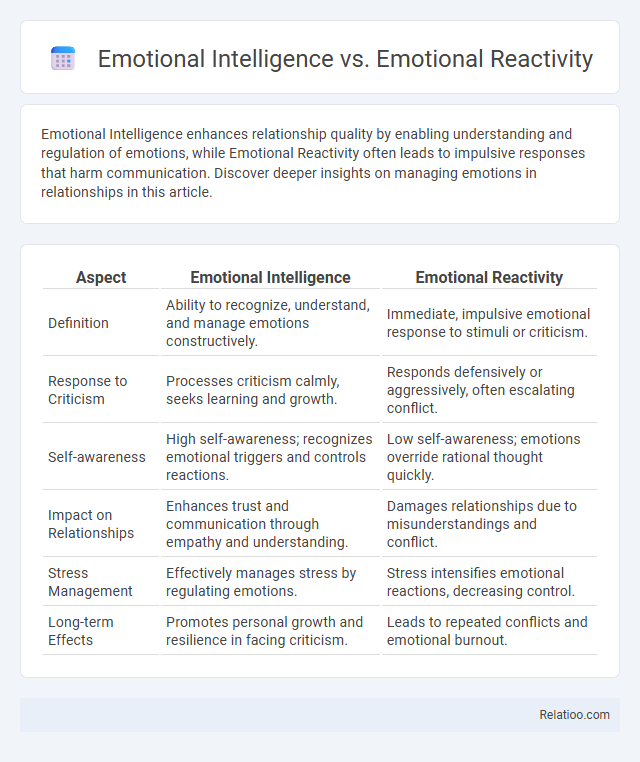Emotional Intelligence enhances relationship quality by enabling understanding and regulation of emotions, while Emotional Reactivity often leads to impulsive responses that harm communication. Discover deeper insights on managing emotions in relationships in this article.
Table of Comparison
| Aspect | Emotional Intelligence | Emotional Reactivity |
|---|---|---|
| Definition | Ability to recognize, understand, and manage emotions constructively. | Immediate, impulsive emotional response to stimuli or criticism. |
| Response to Criticism | Processes criticism calmly, seeks learning and growth. | Responds defensively or aggressively, often escalating conflict. |
| Self-awareness | High self-awareness; recognizes emotional triggers and controls reactions. | Low self-awareness; emotions override rational thought quickly. |
| Impact on Relationships | Enhances trust and communication through empathy and understanding. | Damages relationships due to misunderstandings and conflict. |
| Stress Management | Effectively manages stress by regulating emotions. | Stress intensifies emotional reactions, decreasing control. |
| Long-term Effects | Promotes personal growth and resilience in facing criticism. | Leads to repeated conflicts and emotional burnout. |
Understanding Emotional Intelligence
Emotional intelligence involves recognizing, understanding, and managing one's own emotions as well as empathizing with others, enabling thoughtful responses rather than impulsive reactions. In contrast, emotional reactivity entails immediate, automatic emotional responses that often bypass rational thought, leading to heightened stress or conflict. Self-defense mechanisms arise as protective strategies triggered by perceived threats, but emotional intelligence promotes awareness and regulation that can prevent defensive behaviors and foster healthier interpersonal dynamics.
Defining Emotional Reactivity
Emotional reactivity refers to the immediate, automatic response to emotional stimuli, often driven by the amygdala's quick activation before rational thought occurs. Unlike emotional intelligence, which involves recognizing and managing emotions thoughtfully, emotional reactivity triggers impulsive behaviors and can escalate conflicts. Self-defense mechanisms may arise from heightened emotional reactivity, as individuals seek to protect themselves from perceived emotional threats.
Key Differences Between Emotional Intelligence and Emotional Reactivity
Emotional Intelligence involves the ability to recognize, understand, and manage your emotions effectively, leading to thoughtful responses rather than impulsive reactions. Emotional Reactivity, by contrast, triggers immediate, often intense emotional responses without deliberate control, which can result in heightened stress or conflict. Understanding these key differences helps you develop better self-awareness and healthier emotional regulation strategies compared to defensive reactions driven by instinct.
The Impact of Emotional Intelligence on Relationships
Emotional intelligence enhances your ability to understand and manage emotions, leading to healthier and more empathetic relationships. Unlike emotional reactivity, which triggers impulsive responses that can harm interactions, emotional intelligence fosters thoughtful communication and conflict resolution. Developing emotional intelligence strengthens your self-defense mechanisms by promoting emotional regulation rather than defensive aggression.
Consequences of Emotional Reactivity in Daily Life
Emotional reactivity often leads to impulsive decisions and strained relationships, impairing effective communication and problem-solving in daily life. High emotional reactivity can trigger stress responses that negatively affect mental health and overall well-being, increasing the risk of anxiety and depression. Unlike emotional intelligence, which promotes self-awareness and regulation, unchecked emotional reactivity may result in defensive behaviors that escalate conflicts and reduce social support.
Benefits of Developing Emotional Intelligence
Developing emotional intelligence enhances your ability to recognize, understand, and manage emotions, leading to improved decision-making and stress management compared to emotional reactivity, which often results in impulsive responses. Unlike self-defense mechanisms that protect you from perceived threats but may cause emotional distance, emotional intelligence fosters empathy and healthy communication. This growth in emotional intelligence supports stronger relationships, increased resilience, and greater overall well-being.
Triggers and Causes of Emotional Reactivity
Emotional reactivity stems from sudden, intense responses triggered by perceived threats or unresolved past experiences, contrasting with emotional intelligence's ability to regulate and understand these emotions. Self-defense mechanisms often arise as automatic reactions to avoid emotional pain, where triggers can include criticism, rejection, or stress that activate fight-or-flight responses. Recognizing these triggers and underlying causes enables improved emotional intelligence, fostering healthier coping strategies instead of reactive defense behaviors.
Strategies to Improve Emotional Intelligence
Strategies to improve emotional intelligence include developing self-awareness through mindfulness practices, enhancing empathy by actively listening to others' perspectives, and practicing emotional regulation techniques such as deep breathing or cognitive reframing. Emotional reactivity can be managed by recognizing triggers and pausing before responding, which shifts automatic reactions to thoughtful responses. Building self-defense mechanisms involves setting healthy boundaries and cultivating assertiveness to protect emotional well-being without escalating conflicts.
Managing and Reducing Emotional Reactivity
Managing and reducing emotional reactivity involves cultivating emotional intelligence skills such as self-awareness, self-regulation, and empathy to process feelings thoughtfully rather than impulsively. Emotional intelligence enables individuals to recognize triggers and respond with controlled behavior, while emotional reactivity often leads to automatic, intense emotional responses that can escalate conflicts. Developing self-defense mechanisms rooted in emotional intelligence helps shift from reactive to proactive responses, promoting resilience and healthier interpersonal interactions.
Choosing Emotional Intelligence Over Emotional Reactivity
Choosing emotional intelligence over emotional reactivity empowers you to respond thoughtfully in challenging situations, enhancing self-awareness and impulse control. Emotional intelligence involves recognizing and managing your emotions, while emotional reactivity triggers immediate, often unproductive, responses driven by stress or fear. Developing emotional intelligence strengthens your self-defense mechanisms by promoting calm, strategic decision-making instead of reactive defense behaviors.

Infographic: Emotional Intelligence vs Emotional Reactivity
 relatioo.com
relatioo.com